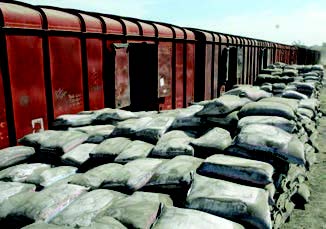MUMBAI (TIP): Cement prices across the country are likely to go up by Rs 3-5 per 50 kg bag following railway minister Suresh Prabhu’s proposal to increase freight rates in his maiden budget. Cement producers will, however, take a call on increasing prices only after studying the Union Budget on February 28.
Prabhu has hiked freight rates by Rs 21 per tonne of cement transportation and also announced increase in freight rates of coal and slag, by Rs 45.70 per tonne and Rs 20.9 a tonne, respectively. Although unhappy with the move, cement manufacturers said they would wait for the main Budget to take a final call on raising prices which are already subdued as demand has not picked up.
“The industry was looking for some incentive from the Rail Budget. The impact of the freight hike would vary from company to company based upon their dependency on rail. Back of the envelop calculations suggest that our cost of production is likely to go up by Rs 7-10 per bag of 50 kg due to the proposed freight hike on various inputs and commodities,” a CEO of a leading cement firm said on conditions of anonymity.
The coal and steel sectors, on the other hand would see only a marginal impact depending on the location of the plant frpm the raw material source. Despite increase in freight rates of coal, industry sources did not see the possibility of an increase in power tariffs. Ravi Uppal, MD & CEO, Jindal Steel and Power Ltd (JSPL) believes the 6.3% hike in freight rates for coal will dent a range of industries and is also out of whack with the Make in India spirit. Sanjeev Churiwala, CFO, Ambuja Cement believes that the proposed hike in freight of raw materials and cement will increase product prices between Rs 20 and and Rs 60 per tonne of cement. “It will be too early to say if the increased cost will be passed on to consumers as prices are already depressed and demand is yet to pick up,” Churiwala said, while adding that in case the cement firms are not able to pass on the increased cost to consumers, it will further erode their EBIDTA margins by 1%.
“The freight increase will majorly impact cement prices as urea, LPG and kerosene prices are regulated and subsidised by the government so there won’t be any increase in prices of these commodities,” said Rajaji Meshram, director, Transport at KPMG.
“It is surely inflationary in nature but that could have been avoided by focusing on internal efficiency improvements. Companies will tend to pass on a portion of this to end consumers. A lot depends on how the overall demand picks up in the near term, however, as long as we have higher growth, nobody would complain,” GV Subrahmanyam, partner, Grant Thornton India LLP said. According to Parikshit Arya, Jt. MD, Rhenus Logistics, the increase in freight rates will impact the manufacturing industry as these are their key ingredients. “Ultimately the manufacturing cost increase due to freight rise will be passed on to the end users. Also the consumer of these raw materials may move cargo by road rather than railways, if the rail freight is not competitive enough,” said Arya.
